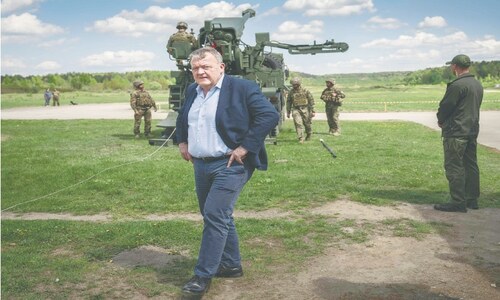NEW DELHI: Indian and Chinese troops have started pulling back on Monday from their eyeball-to-eyeball proximity in several places in the Himalayan border that saw a deadly scuffle last month in which 20 Indian soldiers were killed.
According to the Indian side, India’s National Security Adviser Ajit Doval and Chinese State Councillor and Foreign Minister Wang Yi spoke to each other on Sunday and “agreed” it was “necessary to ensure at the earliest complete disengagement of troops along the LAC” and “de-escalation from India-China border areas for full restoration of peace and tranquillity”.
In Beijing, in response to a question on whether China has withdrawn troops from the Galwan Valley, Foreign Ministry Spokesperson Zhao Lijian said at Monday’s press briefing that the two sides have agreed on disengagements of frontline soldiers. “We hope the two sides could meet each other halfway in implementing these agreements,” Zhao said.
The Global Times said the current diplomatic and military talks between China and India aimed to prevent the situation from deteriorating, and it is a consensus reached by the two sides to defuse the tensions. It was quoting Qian Feng, director of the research department of the National Strategy Institute at Tsinghua University in Beijing.
The Chinese daily said details of agreements implementation, such as who withdraws soldiers first from the border area, may be carried out in a “silent” fashion, to avoid further stirring public opinion or provoking irrational sentiments, especially in India.
Indian reports claimed nevertheless that the Chinese had withdrawn troops by at least a kilometer in three places in Ladakh including the tense Galwan river valley. They said Indian soldiers have also pulled back and a buffer zone has been created between the troops of both sides, according to the sources.
“It is the first phase of the disengagement process. Further steps will be taken after the next round of military level talks,” said the sources.
India’s Ministry of External Affairs stressed that the two sides “should also ensure a phased and stepwise de-escalation”. It said they “re-affirmed that both sides should strictly respect and observe the Line of Actual Control” and “should not take any unilateral action to alter the status quo” and “work together to avoid any incident in the future that could disturb peace and tranquillity in border areas”.
The Chinese Foreign Ministry, in its statement, said both sides “welcomed the progress” achieved in the recent military and diplomatic meetings, agreed to stay in dialogue and consultation, and stressed the importance to promptly act on the consensus reached in the commander-level talks between Chinese and Indian border troops, and “complete disengagement of the front-line troops as soon as possible”.
But, on the Galwan Valley, Beijing did some hard-talk in its statement, The Indian Express said.
“The right and wrong of what recently happened at the Galwan Valley in the western sector of the China-India boundary is very clear. China will continue firmly safeguarding our territorial sovereignty as well as peace and tranquility in the border areas.” It did not, however, repeat its claim of sovereignty over the Galwan Valley.
The Indian readout did not counter this part of the Chinese statement – and this is being read perhaps as a conciliatory space yielded to Beijing, the Express said.
The Chinese Foreign Ministry also said both sides “agreed” to strengthen communication through the mechanism of the SRs, hold meetings of the Working Mechanism for Consultation and Coordination on China-India Border Affairs without interruption, consistently improve and strengthen confidence-building measures and “prevent more incidents that undermine peace and tranquility in the border areas”.
Published in Dawn, July 7th, 2020
















































Dear visitor, the comments section is undergoing an overhaul and will return soon.